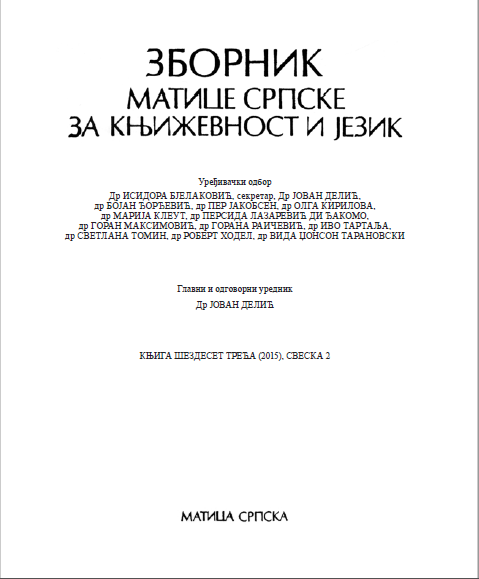КОГНИТИВНЕ ОСНОВЕ ПОСТКЛАСИЧНЕ НАРАТОЛОЕИЈЕ
COGNITIVE BASES OF POSTCLASSICAL NARRATOLOGY
Author(s): Dejan D. MilutinovićSubject(s): Cognitive Psychology, Theory of Literature
Published by: Матица српска
Keywords: Cognitive narratology; Postclassical narratology; Literature;
Summary/Abstract: The paper illustrates basic theoretical and methodological postulates of cognitive narratology (CN). The introductory part tackles the narrative turn and the appearance of postclassical narratology, i.e. changes that happened in social sciences and humanities which imply the privileged place of narratology and its methodology in these sciences. These changes also imply that narratology broadens the horizon of its research from the story as a literary phenomenon to the story as a form of the storage of knowledge. The first part of the paper (I) focuses on the genesis of cognitive narratology, with the most important disciplines and methodologies (theories) in its appearance being phenomenology, psychology, studies of artificial intelligence and theories based on the reader’s response. In the second part (II) CN is defined as the study of aspects of the practice of narration that are important for cognition (mind, thought/understanding, feeling and desire). It is transmedial because it investigates the relations of the mind and the narrative, not just in written texts but in all forms of communication. In that sense the relevant aspects of CN are: the creation and interpretation of the narrative, the production of the story by the narrator, the processes byway of which interpretors create sense in narrative worlds (worlds of the story) evoked by narrative representations and artifacts, as well as cognitive states and dispositions of the heroes of these worlds. Because of that it can be said in principle that cognitive narratology deals with the problem of textual impulses and the reader’s mental reactions. Special attention is paid to the problems such as: worlds of the story, scripts and frames. The third part (III) illustrates the inclination of CN to study the emotional aspect of narrativity, i.e. the mapping of the worlds of the story and revising classical narratological concepts of time and space (chronotopes). The final segment (IV), the conclusion, singles out current fields of research of CN.
Journal: Зборник Матице српске за књижевност и језик
- Issue Year: 63/2015
- Issue No: 2
- Page Range: 521-532
- Page Count: 12
- Language: Serbian

